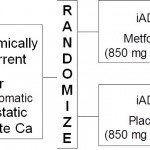goes to…APCaRI member Russ Greiner
Image of DREAM challenge winners, Russ Greiner pictured on far […]
Image of DREAM challenge winners, Russ Greiner pictured on far […]
NMIN Funded Theme I Project in Targeted Drug Delivery Development […]
It’s Movember, time to grow your moustache to raise funds […]
University Hospital Foundation – Kaye Fund Awards Congratulations to two […]
The TrueNTH (pronounced True North) Lifestyle Management (LM) Program is […]

The PRIME Study – Prevention and Intervention for MEtabolic syndrome:
Androgen deprivation therapy (ADT), and newer manipulations of androgen receptor signaling have improved outcomes for advanced prostate cancer (PCa) patients. The toxicities of ADT are many, including an increased risk of developing metabolic syndrome (MS; defined as at least 3 of: hyperglycemia; abdominal obesity; hypertriglyceridemia; reduced HDL cholesterol; and/or hypertension). MS is associated with an increased risk of diabetes, cardiovascular disease mortality, stroke mortality, and all-cause mortality. The prevalence of MS in men receiving ADT is at least 50% and contributes to decreased quality of life and increased non-cancer-related mortality. Metformin holds promise as a countermeasure to MS development, and also has been shown to suppress PCa growth in pre-clinical models.
We hypothesize that the addition of metformin to ADT will reduce the rates of MS in men with advanced PCa, diminishing important toxicities of a therapy universally used in advanced disease.
We propose a double-blind, randomized phase III study of metformin or placebo in men with PCa starting intermittent ADT. The primary endpoint is the difference in MS rates at 1 year. Other aims include evaluation of the influence of metformin on: individual MS components at additional time points; mean serum insulin levels and measures of insulin resistance; weight and quality of life.
A finding that metformin reduces MS incidence and/or has other benefits would change practice, as it would provide a practical and inexpensive strategy to reduce toxicity of an intervention employed in most men with advanced PCa.